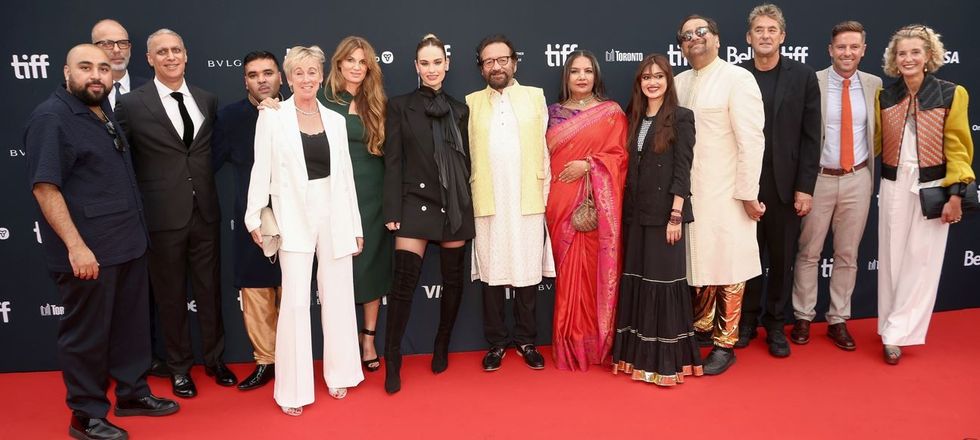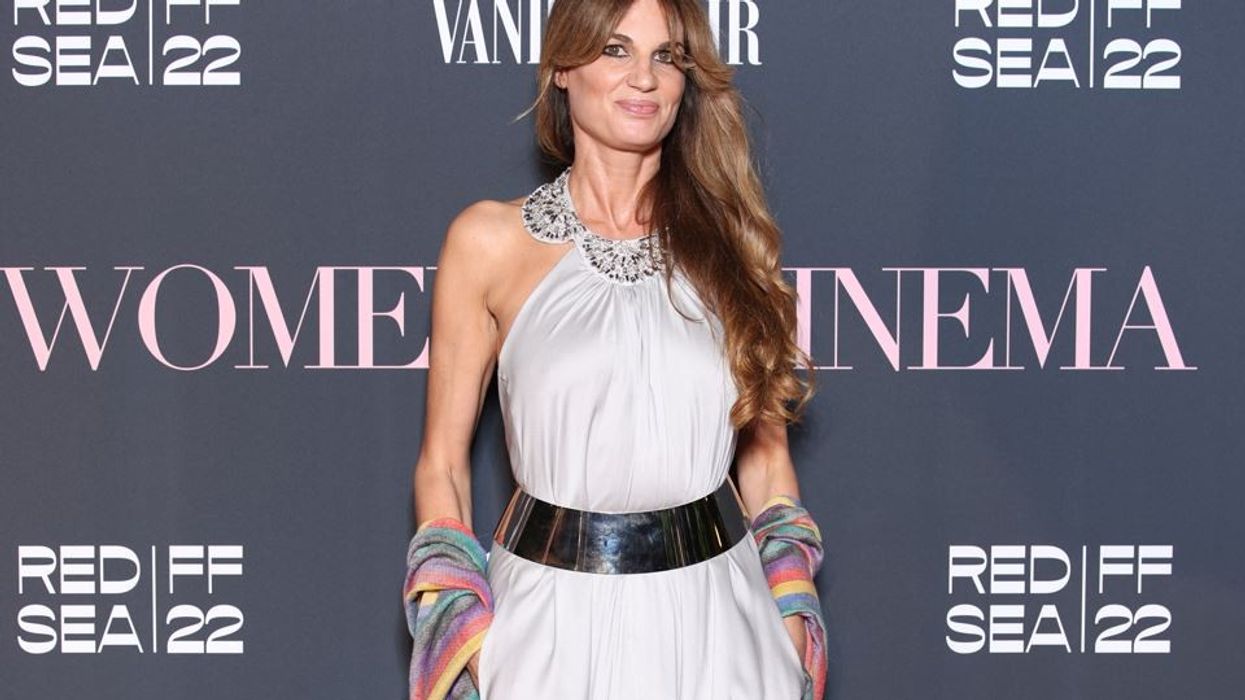WRITER and producer Jemima Khan said she drew inspiration for her new film, What’s Love Got To Do With It? from the royal family to tackle the stigma around arranged marriages.
Directed by Shekhar Kapur, the story centres around Kazim, played by Shazad Latif (Star Trek: Discovery, Penny Dreadful) who travels from London to Pakistan for an arranged marriage.
In a key scene, Kazim is asked if he is in love with his soon-to-be wife. He replies, “Whatever ‘in love’ means”, words famously spoken by then Prince Charles when he was asked the same question after his February 1981 engagement to Diana.
“I’m really glad that you flagged that up because a lot of people don’t really notice it (the line in the film),” Jemima told Eastern Eye. “It was very much to make the point that people here in the UK see arranged marriage as kind of a foreign and alien concept.
“And yet, our royal family has been practising arranged marriage until very, very recently. Charles and Diana were effectively an arranged marriage, even though, sadly, it was not a successful one.”
Jemima revealed she also wanted to reference Diana because of the relationship the late princess of Wales had with Pakistan. “Princess Diana visited me in Pakistan a few times and really had a lot of affection towards the country. Also, she is someone Pakistanis know and it’s a conversation that is had because of her relationship with (Dr) Hasnat Khan, who is Pakistani.”
Diana dated the cardiologist for two years in the mid-1990s shortly before her death in 1997.
Love was also the reason for Jemima’s foray into Pakistan. She married former Pakistan prime minister and World Cup winning cricket captain Imran Khan in May 1995 in a union that lasted a decade.
Though theirs wasn’t an arranged marriage, Jemima said her outlook changed over time as she became involved with arranged marriages in Imran’s family.

“I happened to marry into a very conservative family. I was the only non-arranged marriage,” she said. “I lived in a joint family system. I lived with all my ex-husband’s family - his father, his sisters, their husbands and their children in one house.
“I watched arranged marriages take place. I was involved in the selection process of those marriages. I came away with a completely different view of arranged marriage, as a result of that experience.
“Having gone in with quite a cynical view, I came out with a completely different point of view.”
She added: “I lived with Imran’s niece Hadra and an entire extended family for the first five years. Hadra was 13 when I first went to Pakistan, and I saw her enter an arranged marriage aged 20.
“One of the lines in my film comes directly from her. It’s where her mother says to her, ‘I want you to choose’ – referring to a future husband. Hadra said to me, ‘Why don’t you choose for me, so I have someone to blame if it doesn’t work out.’”
Jemima, 48, said looking back now, she herself would have been open to an arranged marriage if her parents had found her a suitable candidate.
“Imagine! It would have saved me a whole lot of trouble,” she laughed.
What’s Love Got To Do With It? has an all-star cast that includes Golden Globe nominee Lily James, Oscar-winning actress Emma Thompson, acclaimed Indian actress Shabana Azmi, and Pakistani television star Sajal Ali.
James plays Zoe, a documentary filmmaker who is childhood friends with Kazim and films his hilarious yet heart-breaking journey of not only navigating his way through an arranged marriage, but also as someone of south Asian heritage living in the UK.
In one scene, Kazim tells Zoe that though they lived most of their lives next door to each other, for him it actually felt like they grew up in different continents due to the struggles he faced as an Asian.
Jemima explained she addressed racism, unconscious bias, identity and what it means to be British in the film for personal reasons.
“It’s something that is very hard to see unless you are living it,” she said. “I am a mother of two half-Pakistani kids with very Pakistani names in Sulaiman and Kasim Khan. I see things in probably a slightly different way to how my friends I grew up with see things.
“You only know something like unconscious bias if you’ve had some experience or someone very close to you has had some experience of it. These attitudes do persist, and they are still an issue today on both sides.
“My ex-husband’s family had to deal with the shock of him marrying out as well. It’s disingenuous pretending these problems don’t exist now that we are liberal and enlightened.”

Jemima described her film as a ‘love letter to Pakistan’, where she lived for a decade before returning to the UK after her divorce in June 2004.
“This place is where I kind of feel like I grew up. I went there when I was 20 and I was 30 when I left. I feel like it became a part of me,” she said.
“I have huge affection for the country and have many Pakistani friends. I still get a lot of love from Pakistan, and I am very lucky and very grateful for that.
“I just really hope that Pakistanis like it.”
Jemima said she wanted to celebrate Pakistan’s progress, in contrast to how it is portrayed by Western media as a “really scary, dark place”.
“Art and culture have the capacity of bringing people together. I think it’s really important not to forget that. Just five years ago, it was illegal for women to watch cinema in some parts of Pakistan; women could not drive, and here we are, celebrating women in film.
“This movie has very powerful female leads and it’s about multiculturalism, tolerance and love. It’s important to take that message around the world and be willing to be open with people.”
Though the character of Zoe has shades of Jemima’s own journey of exploring Pakistan and tackling some of the misunderstandings and prejudices she has of the culture, the writer insisted it is not a biopic.
“Every single anecdote or character or line in the film comes from either someone I met in real life or an experience that I have had in my own life; but it’s not a biopic, it’s not my story,” Jemima said.
“You can tell it’s definitely based on stuff that I saw or experienced. And it also reflects my journey and my understanding of what an arranged marriage is.”
It took Jemima 10 years to complete the screenplay for What’s Love Got To Do With It? She has previously written for the New Statesman, the Sunday Times and the Independent.
Jemima also produced award-winning shows such as The Clinton Affair, The Case Against Adnan Syed, and We Steal Secrets: The Story of WikiLeaks.
Jemima said she found the collaborative aspect of filmmaking enlightening.
“What you set out to do evolves so much from your original vision. It’s such a massive collaboration of so many different visions. It becomes something completely different, takes on a life of its own, in a brilliantly positive way, which I think I probably hadn’t fully understood when I was writing the script,” she said.
On writing more screenplays, Jemima said: “I’ve produced a lot of things, mainly documentaries, but writing gives me the greatest satisfaction. However, it’s also the thing that I find, by far, the hardest.”
She spoke of her hope to give back to Pakistan by working with Fatima Bhutto, the niece of the former prime minister of the country, Benazir Bhutto, to start a fund or mentoring programme in order to help Pakistani filmmakers.
“Pakistan has incredible talent. I’m talking to my friend Fatima Bhutto about putting together a fund or mentorship plan to help filmmakers in Pakistan get their work made and seen globally,” she said.




